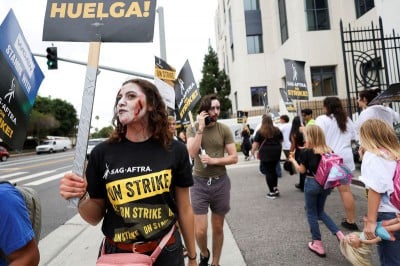 © Reuters. FILE PHOTO: SAG-AFTRA members walk the picket line during their ongoing strike outside Sony Studios in Culver City, California, U.S. September 29, 2023. REUTERS/Mario Anzuoni/File Photo 2/2
© Reuters. FILE PHOTO: SAG-AFTRA members walk the picket line during their ongoing strike outside Sony Studios in Culver City, California, U.S. September 29, 2023. REUTERS/Mario Anzuoni/File Photo 2/2 By Dawn Chmielewski and Lisa Richwine
LOS ANGELES (Reuters) - Santa Claus will not be coming to Hollywood this year.
“Dear Santa,” a comedy by the Farrelly brothers about a young boy who accidentally sends a letter to Satan instead of Santa, will not reach theaters this holiday season, one of many victims of a prolonged actors’ strike that has set the U.S. entertainment industry reeling from one of the longest work stoppages in its history.
The strike, which has entered its 14th week, is scrambling next year’s film slate and delaying the return of primetime television comedies and dramas.
While film and television writers have ended their 148-day work stoppage, talks between actors and studios broke down last week and both sides said they remain far apart on many issues with no negotiations scheduled.
Major releases such as “Mission: Impossible -- Dead Reckoning Part 2,” “Gladiator 2” and “Ghostbusters: Afterlife 2” have been delayed because of the walkout, as was “Bob Marley: One Love,” a biopic about the reggae musician that was receiving early Oscar buzz. Other films, such as the romantic comedy, “Anybody But You,” cling tenuously to the December release calendar, but could be postponed if its stars remain on strike and unavailable to help with promotion, sources with direct knowledge told Reuters.
“The whole release calendar is going to be tossed around,” said one studio executive, who identified two major movies and an animated sequel with release plans that have been tossed into the wind. “The whole thing is a giant Rubik’s Cube.”
One film financier shifted investment strategies as Hollywood’s work stoppage stalled several big-budget studio projects, backing productions outside of North America instead, including director Guy Ritchie’s next film starring Jake Gyllenhaal and Henry Cavill, which is shooting in Spain.
Media analyst Doug Creutz noted that the strikes “came at a very difficult time” for major media companies already contending with declines of the traditional cable TV business, weak ad performance and streaming services that mostly lose money. Add to those concerns a struggling movie business, whose holiday quarter box-office proceeds could fall 30% or more below pre-pandemic levels, as the actors’ strike forces the delayed release of several movies.
Warner Bros. Discovery (NASDAQ:WBD), which pushed “Dune: Part Two” to March from November, reduced its adjusted earnings estimates for this year by $300 million to $500 million. Other studios are expected to provide an accounting of the strike’s financial toll on upcoming quarterly investor calls over the next few weeks.
WINTER IS COMING Among the hardest hit are independent production companies, whose lifeblood comes from delivering movies and television shows. After taking a series of cost-cutting measures, like curtailing travel and entertainment, they are contemplating layoffs, say several executives at the companies. Some have sold rights to film and television libraries to keep the lights on, one buyer told Reuters.
Television executives hope to return to production in December, or by February or March at the latest, to produce a shortened season of primetime shows, with half-hour comedies returning to air more quickly than hour-long dramas. Writers are already drafting scripts, these executives said.
At the same time, programmers are embracing unorthodox backup plans to fill screens, such as a “CSI”-inspired reality show focused on local police forensic investigators, which is in the works for CBS, according to two sources familiar with the project.
Some major studio films scheduled for next year could slip into 2025 if the work stoppage continues, according to the studio executive, raising concern that audiences will get out of the habit of going to theaters. One exhibitor expressed concern about how to fill movie screens in the second half of 2024, remarking, “There’s nothing in production.”
How the Hollywood strike is scrambling film, TV schedules into next summer 1 Recommended

Toyota rides weak yen, demand for hybrids to post blowout profit

Nippon Steel lifts annual outlook on improved first-half margins

BBVA's third quarter profit gain overshadowed by provisions and Turkey loss

Exclusive-Biden eyes adding AI chip curbs to Chinese companies abroad

World Bank says UK aid cuts have caused real pain
